 Your new post is loading...
 Your new post is loading...
There are two theories of intelligence, referred to simply as mindsets, that students can have about their intellectual abilities, although no one has purely one or the other, she said. Individuals with more of a fixed mindset believe that their intellectual abilities are simply fixed. They tend to approach learning with the goal of looking smart, and they often shy away from challenges because they believe that having to work hard at something or making mistakes means they don’t have high ability. Those with more of a growth mindset, on the other hand, believe that abilities can be developed—they are more likely to see effort as something that propels learning and to see setbacks as opportunities to build new skills.
These divergent mindsets are also reflected in how individuals process mistakes on a neurological level. In a study of 25 undergraduate students, Jason S. Moser (Michigan State University) and colleagues tasked participants with rapidly identifying the center letter in a string of similar text (e.g. “M” vs. “N”) while monitoring activity of the anterior cingulate cortex (ACC) and related brain areas associated with cognitive control of behavior, via electroencephalography. The students also completed a scale designed to measure fixed and growth mindsets.
Over the course of 480 trials, participants with growth mindsets demonstrated greater error positivity and greater electrical activity in the ACC and related brain regions associated with attending to mistakes compared with those with fixed mindsets. This boost in Pe was also associated with greater posterror accuracy, suggesting that these participants were processing errors more deeply, allowing them to make corrections immediately. Learn more / En savoir plus / Mehr erfahren: http://www.scoop.it/t/21st-century-learning-and-teaching/?&tag=carol+dweck http://www.scoop.it/t/21st-century-learning-and-teaching/?&tag=Growth+Mindset
Via Gust MEES
If a learner is to develop a sense of can, he or she must learn it. While some students have more natural confidence or initiative than others, can is slightly different than confidence. Can is a mix of knowledge and self-efficacy that has been nurtured through experience — by consistently meeting both internally and externally created goals judged by standards that are also both internally and externally drawn.
So how does this happen? Where does it come from?
Via John Evans, Dean J. Fusto, Miloš Bajčetić
Catherine Good has experienced stereotype threat herself, although she didn’t know it at the time. She started her academic career in pure math, expecting to get a Ph.D. But somewhere along the way she started to feel like it just wasn’t for her, even though she was doing well in all her classes. Thinking that she’d just chosen the wrong application for her love of math, Good switched to math education, where she first encountered the idea of stereotype threat from a guest psychology speaker.
“As he talked about students feeling that they don’t really belong, I had an epiphany,” Good said. She realized the discomfort she’d felt studying mathematics had nothing to do with her ability or qualifications and everything to do with a vague sense that she didn’t belong in a field dominated by men. Stereotype threat is a term coined by psychologists Joshua Aronson and Claude Steele. They found that pervasive cultural stereotypes that marginalize groups, like “girls aren’t good at math,” create a threatening environment and affects academic achievement.
Good was so fascinated by how powerful psychological forces can be on learning, including her own, that she switched fields again to study social psychology, and she ended up working closely with Carol Dweck for several years when Dweck’s growth mindset work was in its early stages and not yet well-known among educators. Good now works at a psychology professor at Baruch College.* Originally, Dweck and Good hypothesized that believing intelligence is flexible — what we now call a growth mindset — could protect students from stereotype threat, an inherently fixed idea.
Via John Evans
How do you teach a Growth Mindset? By letting students struggle and share. This activity has been used by thousands of educators to teach Growth Mindset.
Via John Evans
It's important to recognize that a growth mindset is an overall paradigm for personal development rather than a pedagogical tool for measuring academic accomplishment. 5 Growth Mindset PracticesIn their groundbreaking book, Professional Learning Communities at Work, Richard DuFour and Robert Eaker say it clearly when pointing out the issue that comes about when change initiatives are considered "a task to complete rather than an ongoing process." If we really want to improve our schools, our work, and the education of our students, we can do so by adopting a new mindset -- for everyone -- that would include: - Being humble enough to accept that there are things about ourselves and our practices that can improve
- Becoming part of professional teams that value constructive critique instead of criticism
- Treating setbacks as formative struggles within the learning process instead of summative failures
- Realizing the restrictive role that timelines can play in reaching high standards, and using foundational philosophies such as Universal Design for Learning (UDL) to map systems so that everyone's growth is supported
- Create flexible grouping at all times so that nobody's trapped in any one course level or particular type of work.
Learn more / En savoir plus / Mehr erfahren: http://www.scoop.it/t/21st-century-learning-and-teaching/?&tag=Growth+Mindset
Via Ana Cristina Pratas, Miloš Bajčetić, Gust MEES
Veteran researchers present five strategies—like maintaining success files and allowing choice—to help struggling students develop a positive attitude needed for success.
Via Tom D'Amico (@TDOttawa)
Can intelligence be changed? This article explores this issue, looking at work by Carol Dweck (and colleagues). It looks at "fixed mindsets" and "growth mindsets" and student whom have "growth mindsets" engage "in adaptive behaviors, such as focusing on mastering concepts and developing new strategies after making mistakes." Students with "fixed mindsets showed decrements in performance when faced with negative feedback or failure." Additional information is found in the article.
Via Beth Dichter
|
I had the great privilege of facilitating a staff workshop on growth mindsets for the teachers and staff at Carlos Rosario International School and more recently at ISTE 2015.
Participants were given access to the slide deck in order interact with the slides and resources during the workshop.
What follows are the activities along with some of the resources used during the workshop.
Via John Evans
Thanks to Benjamin Riley, this morning I learned about the results of a big new growth mindset study that was released yesterday, Where and For Whom Can a Brief, Scalable Mindset Intervention Improve Adolescents’ Educational Trajectories? (happily, not behind a paywall).
It’s written by a zillion of the biggest names in Social Emotional Learning Research (David Yeager, Paul Hanselman, David Paunesku, Christopher Hulleman, Carol Dweck, Chandra Muller, Robert Crosnoe, Gregory Walton, Elizabeth Tipton, Angela Duckworth).
Using a representative sample of U.S. schools and their students, they found that students doing two twenty-five minute online lessons about a growth mindset resulted in a small but important academic gain (measured by GPA’s), with larger improvements found among students who had a track record of experiencing academic and socio/economic challenges.
Via John Evans, Cheryl Turner
For today’s post we are sharing with you foster a growth mindset culture in your class. The visual is based on this post from Marcus Guido. We invite you to check it out and share with us your feedback.
Via John Evans
What would you say are a few of the biggest myths about growth mindset?
OK, myth No.1 is the myth that it’s all about effort, and that you instil it by praising effort. Effort is one factor that leads to learning. So the ultimate value is growth, progress, learning. And effort is one thing that leads there but there are many other things – strategies, using resources, getting advice, guidance and mentorship, and when people leave that out and just praise effort, it’s not transmitting a growth mindset. Adults have nagged children for centuries to try harder. That’s not a growth mindset, it’s an adult nagging a child to try harder!
Also, we find that when teachers think it’s just about effort and praising effort they may praise effort that isn’t even there, or that’s not effective. So if a child tries hard at something and you say ‘great job, you tried hard’, but they didn’t make progress, they didn’t advance, you’re actually conveying a fixed mindset because you’re saying ‘great effort, I didn’t really expect you to do that, and I don’t expect you to do that, so I’m trying to make you feel good about not doing it’. So we need people to understand that it’s appreciating a variety of process variables that lead to learning.
The second myth is that you can teach students a lesson on growth mindset and put a poster up in the front of the room, and that’s that, that they will have a growth mindset from then on. And we know if the teacher doesn’t then embody a growth mindset, if teachers don’t embody growth mindsets in their teaching practices, in the way that they give feedback when the child is stuck, and the way they present a new unit, in the way that they give opportunities for revision and growth of understanding – if they don’t embody that growth mindset, they are not teaching it. And in fact, if their behaviour contradicts the poster at the front of the room, then maybe they’re doing a disservice. Learn more / En savoir plus / Mehr erfahren: http://www.scoop.it/t/21st-century-learning-and-teaching/?&tag=carol+dweck http://www.scoop.it/t/21st-century-learning-and-teaching/?&tag=Growth+Mindset
Via Gust MEES
An idea that is beginning to gain a lot of favour in educational circles at the moment is the notion of fixed versus growth mindsets, and how they might relate to students and learning. Based on the work of Stanford University psychologist, Carol Dweck, the idea of mindset is related to our understanding of where ability comes from. It has recently been seized upon by educators as a tool to explore our knowledge of student achievement, and ways that such achievement might be improved. Learn more / En savoir plus / Mehr erfahren: http://www.scoop.it/t/21st-century-learning-and-teaching/?&tag=Growth+Mindset
Via Gust MEES
False growth mindset is saying you have growth mindset when you don’t really have it or you don’t really understand [what it is]. It’s also false in the sense that nobody has a growth mindset in everything all the time. Everyone is a mixture of fixed and growth mindsets. You could have a predominant growth mindset in an area but there can still be things that trigger you into a fixed mindset trait. Something really challenging and outside your comfort zone can trigger it, or, if you encounter someone who is much better than you at something you pride yourself on, you can think “Oh, that person has ability, not me.” So I think we all, students and adults, have to look for our fixed-mindset triggers and understand when we are falling into that mindset.
I think a lot of what happened [with false growth mindset among educators] is that instead of taking this long and difficult journey, where you work on understanding your triggers, working with them, and over time being able to stay in a growth mindset more and more, many educators just said, “Oh yeah, I have a growth mindset” because either they know it’s the right mindset to have or they understood it in a way that made it seem easy. Learn more / En savoir plus / Mehr erfahren: http://www.scoop.it/t/21st-century-learning-and-teaching/?tag=Growth+Mindset https://gustmees.wordpress.com/2016/11/14/pssst-the-most-important-in-education-understanding/ https://gustmees.wordpress.com/2016/11/01/getting-ready-for-modern-education-first-try-to-understand-what-it-is/
Via Gust MEES
I have a recent interest in both Growth Mindsets and Maker Education; and have blogged and presented on both of these topics. As such and because of my passion for both of these area, I have been ...
Via Beth Dichter, Darren Fellowes
|



 Your new post is loading...
Your new post is loading...



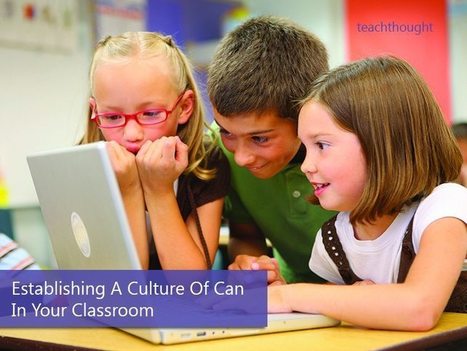

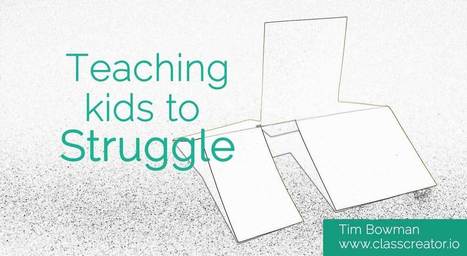


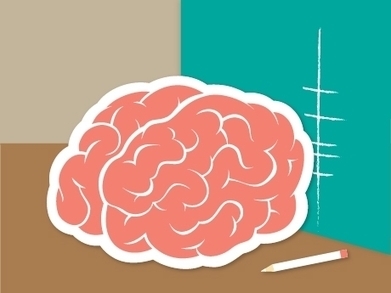



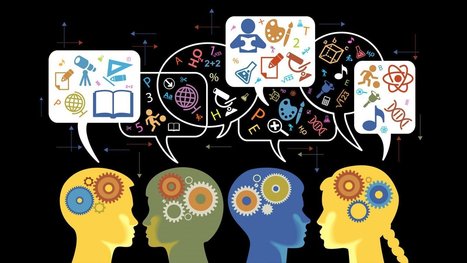





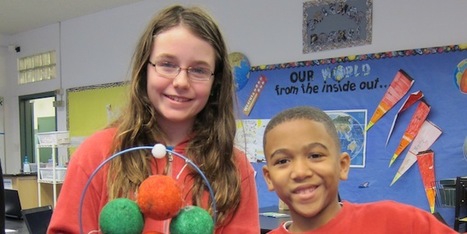
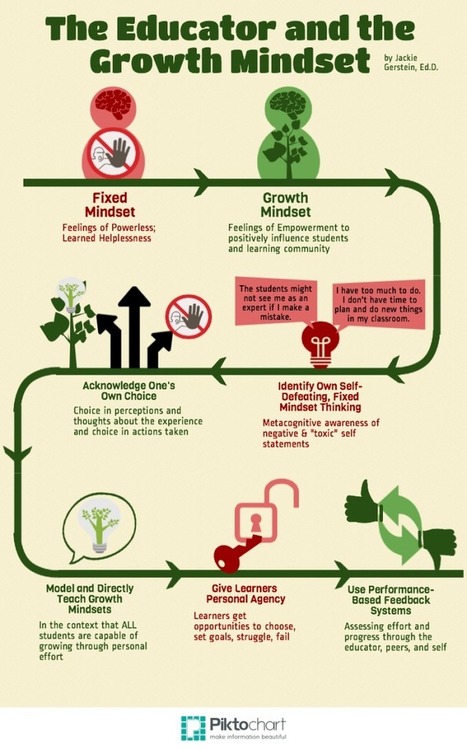
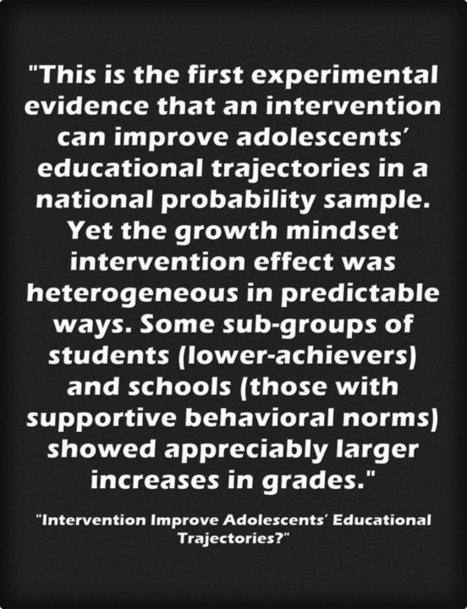
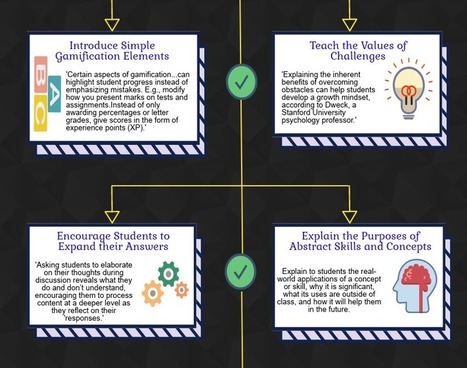




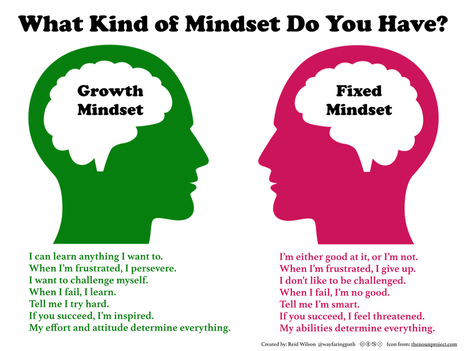



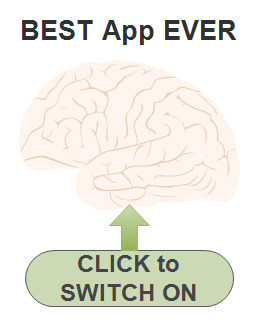
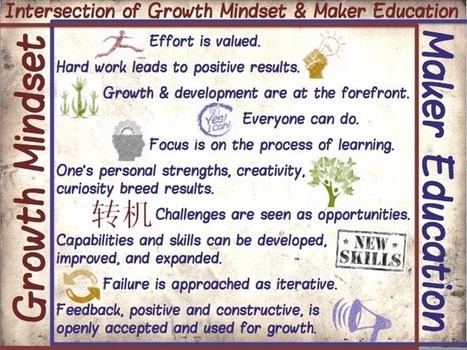

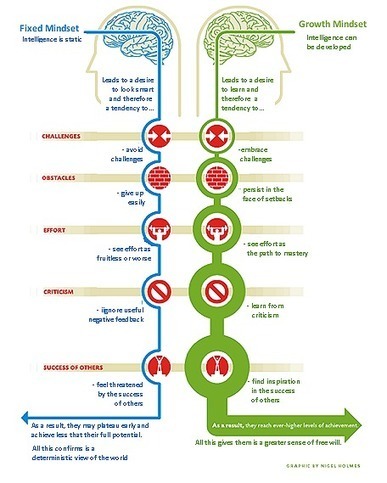








There are two theories of intelligence, referred to simply as mindsets, that students can have about their intellectual abilities, although no one has purely one or the other, she said. Individuals with more of a fixed mindset believe that their intellectual abilities are simply fixed. They tend to approach learning with the goal of looking smart, and they often shy away from challenges because they believe that having to work hard at something or making mistakes means they don’t have high ability. Those with more of a growth mindset, on the other hand, believe that abilities can be developed—they are more likely to see effort as something that propels learning and to see setbacks as opportunities to build new skills.
These divergent mindsets are also reflected in how individuals process mistakes on a neurological level. In a study of 25 undergraduate students, Jason S. Moser (Michigan State University) and colleagues tasked participants with rapidly identifying the center letter in a string of similar text (e.g. “M” vs. “N”) while monitoring activity of the anterior cingulate cortex (ACC) and related brain areas associated with cognitive control of behavior, via electroencephalography. The students also completed a scale designed to measure fixed and growth mindsets.
Over the course of 480 trials, participants with growth mindsets demonstrated greater error positivity and greater electrical activity in the ACC and related brain regions associated with attending to mistakes compared with those with fixed mindsets. This boost in Pe was also associated with greater posterror accuracy, suggesting that these participants were processing errors more deeply, allowing them to make corrections immediately.
Learn more / En savoir plus / Mehr erfahren:
http://www.scoop.it/t/21st-century-learning-and-teaching/?&tag=carol+dweck
http://www.scoop.it/t/21st-century-learning-and-teaching/?&tag=Growth+Mindset
LIVESTOCK ANIMAL EXCHANGE
Testimonials
Raghuram Rastra
Productions to produce a new show about the Beefmaster breed. We continuously receive positive feedback from breeders and commercial cattlemen, so we continue to rely on The American Rancher for advertising opportunities. Great experience!”mineral for our cows this past spring. Now we are using the Vita Charge® Stress Tub and Stress Tub HEAT®. Even with the stress of …Read More
Mrs Sudana Bric
A great book for all ages! livestockanimalexchange.com
Animal Farm is a very good book. I personally think that it’s a book for all ages. For example, little kids can read it and just think it’s a fairy tale about animals whereas, older kids will probably get the true message and understand that it’s about power.
Mr Rob Roy
Animal Farm does not exactly fit the ideal of a modernist novel, as it is written using traditional forms—fable, fairytale, allegory—but it does fit the first two characteristics, at least to some extent. Orwell’s fable is a critique of the modern world, especially of Soviet i recomment https://www.livestockanimalexchange.com/
Gallery
ESCROW SERVICES
Veterinary Department
Dorper sheep breed
Angora Goats For Sale With Good Discount
Excited Student in College
Student in Library
Student Speech during her graduation
Students in Classroom
Published Notice
15 Oct
LEICESTER LONGWOOL SHEEP FOR SALE
LEICESTER LONGWOOL SHEEP FOR SALE Leicester Longwool sheep for sale The Leicester Longwool is one of the “luster longwool” breeds, so designated for the sheen and brilliance of their wool. The sheep appear to shine just after shearing, when the clean wool next to their skin catches the sunlight and makes them glisten for a…
12 Oct
RED BRAHMAN CATTLE FOR SALE
Here at https://www.livestockanimalexchange.com/ , we understand the value of purebred Brahman genetics. We emphasize performance, soundness, fertility and beef production in our Brahman herds. With both gray Brahman and red Brahman cattle for sale, Moreno Ranches is one of the top sellers of Brahman cattle in Florida and now in Texas, too. In fact, people looking for Brahman…
17 Oct
HOLSTEIN HEIFERS CATTLE FOR SALE
HOLSTEIN HEIFERS CATTLE FOR SALE, beef carcass meat, pregnant heifers as well as customers special orders based on the shipping within usa
Contact Us Today
Name *
First
Last
Numbers
Email *
Comment or Message *
CONTACT US ONLINE 24/7 LIVE CHAT
Contact Rent-A-Center online through our customer service inquiry and you will … make your experience more enjoyable, please call us or send us a message. Get answers to the most popular FAQs and easily contact us through either a secure email address, a mailing address WE ARE ALSO ONLINE 24/7 ON OUR LIVE CHAT FEEL FREE TO CONTACT US if we have been this successful in business, it’s because we are honest, reliable and always satisfy our customers,
The American Brahman breed of cattle originated from Bos Indicus cattle. These hardy cattle were originally brought to the United Stated from India. The American Brahman was the first beef cattle breed developed in the United States. The American Brahman are for the most part the result of a cross of four different Indian cattle breeds: Gyr, Guzerat, Nelore and Krishna Valley. Best place to buy livestock online at Livestock Animal Exchange.
The American Brahman cattle originated from a nucleus of approximately 266 bulls and 22 females of several Bos indicus varieties of cattle which were imported into the United States between 1854 and 1926. The American Brahman has been used to develop numerous other U.S. Beef Breeds of cattle including Brangus, Beefmaster, Simbrah and Santa Gertrudis.
Brahman cattle are known for their extreme tolerance to heat and are widespread in tropical regions. They are resistant to insects due to their thick skin. Brahman cattle live longer than many other breeds, often producing calves at ages 15 and older. Best place to order livestock online
At Bulter Brahmans we have both Polled Brahman Cattle as well as Horned Brahman Cattle. If you are looking for Polled Brahman bulls, Polled Brahman heifers, horned Brahman bulls or horned Brahman heifers, we always have a nice selection of American Brahman Cattle available for sale. Best place to buy livestock online within USA and worldwide with express delivery.
Buy Angus Cattle Online,
AVAILABLE CATTLE BRREDS FOR SALE:
Angus cattle for sale
Beefmaster cattle for sale
Brahman cattle for sale
Charolais cattle for sale
Fleckvieh cattle for sale
Girolando cattle for sale
Hereford cattle for sale
Holstein cattle for sale
Limousin cattle for sale
Jersey cattle for sale
AVAILABLE SHEEP BREEDS FOR SALE:
Awassi sheep for sale
Dorset sheep for sale
Dorper sheep for sale
Merino Sheep for sale
Leicester Longwool sheep for sale
Lincoln Sheep for sale
AVAILABLE GOAT BREEDS FOR SALE:
Alpine goats for sale
Boer goats for sale
Spanish goats for sale
Toggenburg goats for sale
White saanen goats for sale
Kalahari goats for sale
AVAILABLE CHICKEN FOR SALE
Boiler chickens for sale
For more details, do not hesitate to contact us.
https://www.livestockanimalexchange.com/en/product/alpine-goats-for-sale/
https://www.livestockanimalexchange.com/en/product/boer-goats-for-sale/
https://www.livestockanimalexchange.com/en/product/black-spanish-goats-for-sale/
https://www.livestockanimalexchange.com/en/product/kalahari-red-goat-for-sale/
https://www.livestockanimalexchange.com/en/product/toggenburg-goat-for-sale/
https://www.livestockanimalexchange.com/en/product/white-saanen-goats-for-sale/
https://www.livestockanimalexchange.com/en/product/angus-cattle-for-sale/
https://www.livestockanimalexchange.com/en/product/beefmaster-cattle-for-sale/
https://www.livestockanimalexchange.com/en/product/charolais-cattle-for-sale/
https://www.livestockanimalexchange.com/en/product/fleckvieh-cattle-for-sale/
https://www.livestockanimalexchange.com/en/product/girolando-cattle-for-sale/
https://www.livestockanimalexchange.com/en/product/hereford-cattle-for-sale/
https://www.livestockanimalexchange.com/en/product/holstein-cattle-for-sale/
https://www.livestockanimalexchange.com/en/product/limousin-cattle-for-sale/
https://www.livestockanimalexchange.com/en/product/jersey-cattle-for-sale/
https://www.livestockanimalexchange.com/en/product/brahman-cattle-for-sale/
https://www.livestockanimalexchange.com/en/product/awassi-sheep-for-sale/
https://www.livestockanimalexchange.com/en/product/dorset-sheep-for-sale/
https://www.livestockanimalexchange.com/en/product/dorper-sheep-for-sale/
https://www.livestockanimalexchange.com/en/product/leicester-longwool-sheep-for-sale/
https://www.livestockanimalexchange.com/en/product/lincoln-sheep-for-sale/
https://www.livestockanimalexchange.com/en/product/merino-sheep-for-sale/
https://www.livestockanimalexchange.com/en/product/boiler-chickens--for-sale/